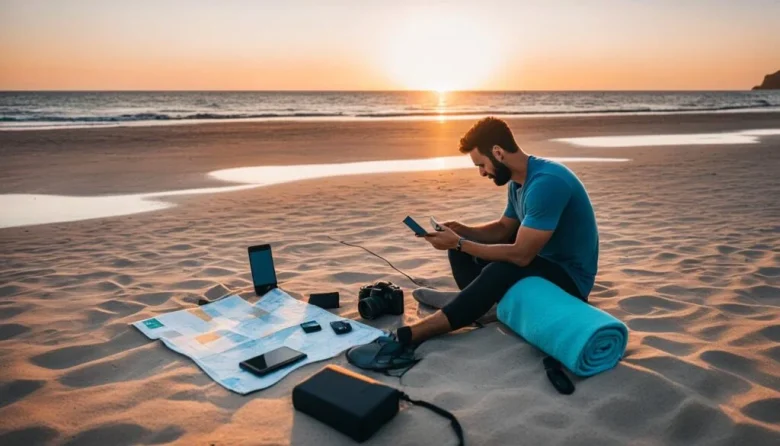Traveling solo is an empowering and enriching experience. It allows you to explore new destinations at your own pace, meet new people, and discover yourself. However, as liberating as it is, solo travel also comes with unique challenges, particularly when it comes to safety. Being prepared and aware can make your journey both enjoyable and secure. This guide provides expert advice on how to stay safe while traveling solo.
1. Research Your Destination Thoroughly
Before embarking on your trip, take the time to research your destination in detail.
- Safety Ratings: Look up the safety ratings and reviews of the city or country you plan to visit. Websites like Travel.State.Gov or international traveler forums can provide valuable insights.
- Local Customs: Understand the cultural norms and practices to avoid offending locals or drawing unwanted attention.
- Emergency Contacts: Note down the local emergency numbers, including the police, hospital, and your country’s embassy.
2. Share Your Travel Plans
Let someone you trust know your itinerary. This includes your accommodation details, transportation plans, and a rough schedule of where you’ll be.
- Check-In Regularly: Stay in touch with a trusted friend or family member, updating them on your whereabouts.
- Digital Backup: Email yourself and a family member copies of important documents, such as your passport, travel insurance, and visa.
3. Choose Accommodations Wisely
Where you stay significantly impacts your safety while traveling alone.
- Read Reviews: Use platforms like Booking.com or Airbnb to read reviews from other solo travelers.
- Location Matters: Opt for accommodations in safe, well-lit areas that are close to public transportation and essential amenities.
- Secure Rooms: Check for basic security features like sturdy locks, peepholes, and well-lit corridors.
4. Be Smart with Your Packing
Packing efficiently not only makes travel easier but also helps with safety.
- Travel Light: Carry manageable luggage to avoid looking overwhelmed or becoming an easy target.
- Essential Items: Bring a portable charger, a first aid kit, and a small flashlight.
- Anti-Theft Gear: Use anti-theft backpacks or money belts to keep valuables secure.
5. Stay Aware of Your Surroundings
One of the golden rules of solo travel is to always stay alert.
- Blend In: Avoid standing out as a tourist by dressing modestly and respectfully according to local norms.
- Limit Distractions: Don’t walk around glued to your phone or with headphones on. Stay focused on what’s happening around you.
- Observe Locals: Pay attention to how locals behave. This can help you adapt and notice anything out of the ordinary.
6. Trust Your Instincts
Your gut feeling is often your best ally when it comes to safety.
- If something or someone makes you uncomfortable, don’t hesitate to leave the situation.
- Choose accommodations, restaurants, or activities that feel safe and trustworthy.
- Politely decline invitations or conversations if they feel intrusive or suspicious.
7. Avoid Over-Sharing
In the age of social media, it’s tempting to post updates in real-time, but this can be risky when traveling solo.
- Delay Posts: Share pictures and updates after you’ve left a location.
- Be Vague: Avoid tagging your exact location while you’re still there.
- Limit Information: Don’t share personal details like your accommodation or itinerary with strangers.
8. Secure Your Finances
Financial security is essential while traveling.
- Diversify Storage: Keep your cash and cards in separate places, such as a money belt, wallet, and hidden compartments.
- Notify Your Bank: Inform your bank about your travel plans to avoid account freezes.
- Use ATMs Carefully: Opt for ATMs in secure, well-lit locations, preferably inside banks.
9. Learn Basic Local Phrases
Knowing a few key phrases in the local language can be a lifesaver.
- Ask for Help: Learn how to say “help,” “emergency,” and “where is…” in the local language.
- Navigation: Phrases like “left,” “right,” and “straight” can help with directions.
- Politeness: Greetings and basic courtesies help build rapport with locals.
10. Stay Connected
Staying connected ensures you can reach help when needed.
- Local SIM Card: Buy a local SIM card or activate an international plan to have constant access to mobile networks.
- Offline Tools: Download offline maps and translation apps for areas with poor connectivity.
- Emergency Contacts: Keep a list of emergency numbers accessible at all times.
11. Avoid Risky Behavior
As tempting as it may be to throw caution to the wind, solo travelers should avoid unnecessary risks.
- Limit Alcohol: Drinking excessively can impair judgment and make you vulnerable.
- Stick to Public Areas: Avoid exploring isolated or poorly lit places, especially at night.
- Be Cautious with Strangers: While making friends is part of the journey, be wary of sharing too much or accepting offers from strangers.
12. Use Transportation Safely
Navigating transportation is often a key part of solo travel.
- Ride Apps: Use reputable ride-hailing apps like Uber or Lyft instead of hailing taxis from the street.
- Stay in Public: Wait for buses, trains, or rides in well-lit, busy areas.
- Night Travel: Avoid traveling late at night unless absolutely necessary. If you must, stick to reliable transport options.
13. Invest in Travel Insurance
Travel insurance is an essential safeguard for solo travelers.
- Comprehensive Coverage: Choose a plan that covers health emergencies, cancellations, theft, and accidents.
- Emergency Assistance: Look for insurance providers that offer 24/7 emergency assistance.
14. Know Exit Strategies
Familiarize yourself with exit plans for different scenarios.
- Accommodation: Locate emergency exits in your hotel or hostel.
- Public Spaces: Note nearby exits in crowded areas like markets or train stations.
- Escape Routes: Have a backup plan if public transport fails or you feel unsafe.
Solo travel offers freedom, growth, and adventure, but safety should always be a priority. By planning ahead, staying alert, and following these expert tips, you can enjoy a fulfilling and secure solo travel experience. Remember, confidence and caution go hand-in-hand when navigating new destinations on your own.
Your safety is the foundation of a memorable journey—so travel smart and explore the world with peace of mind!




